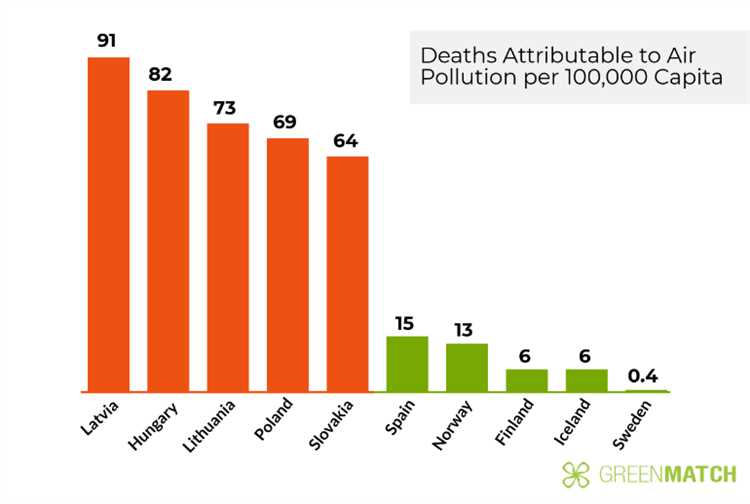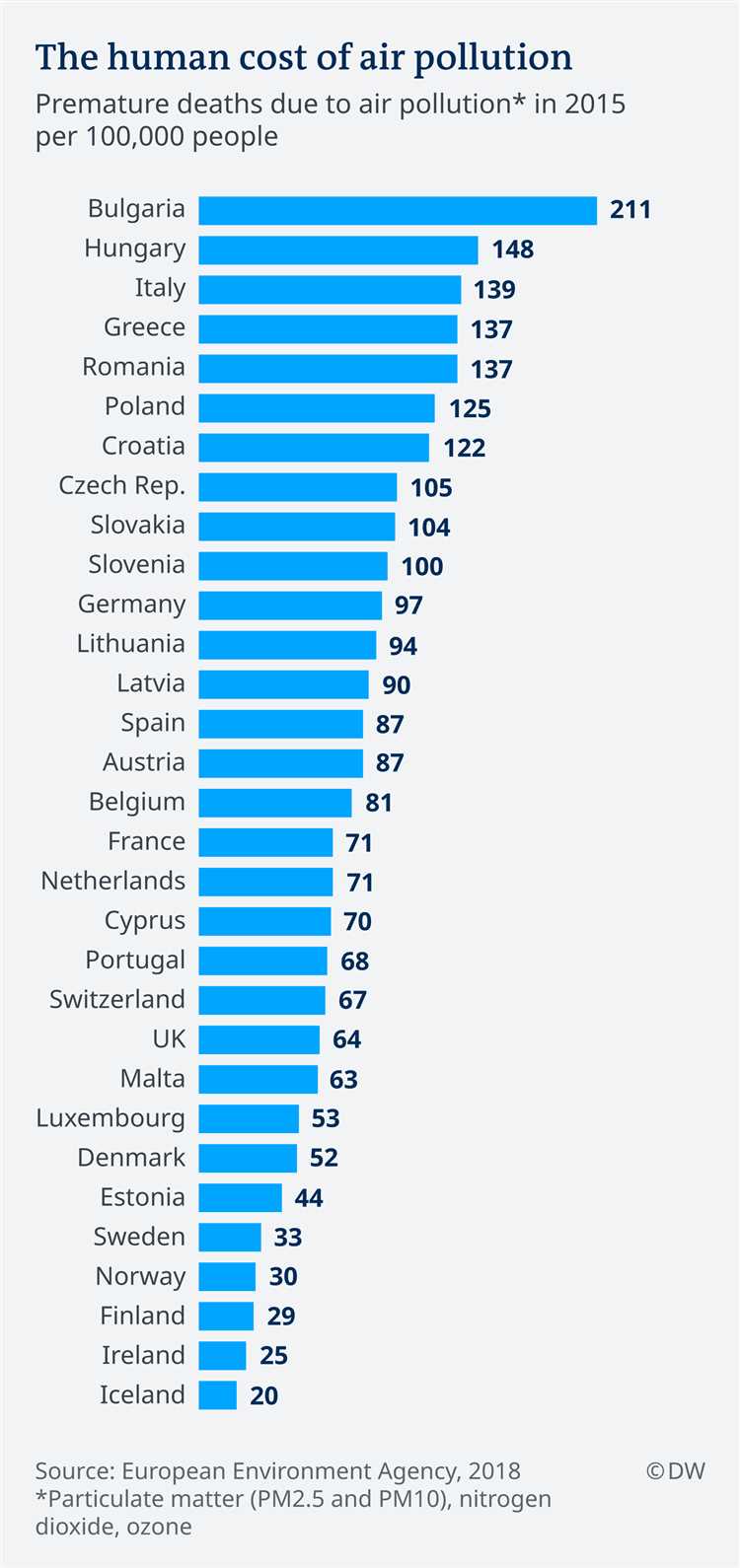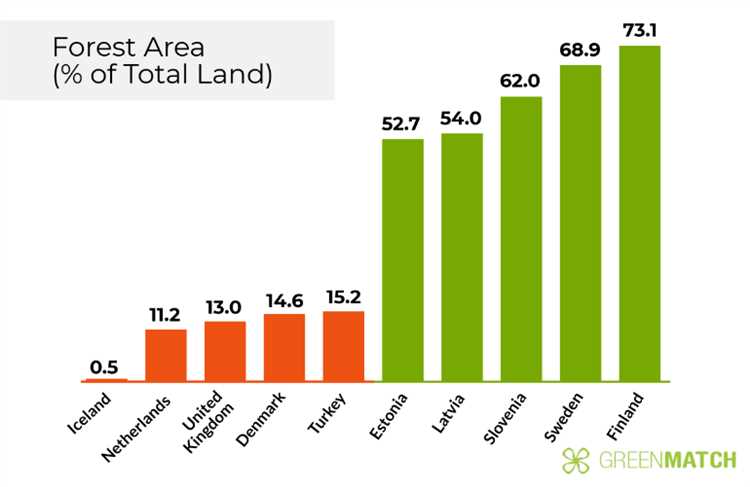
Europe is home to many nations that prioritize environmental standards to protect and preserve their natural landscapes. With a focus on sustainability and eco-conscious policies, these countries are leading the way in creating a cleaner and greener future.
When it comes to determining the cleanest country in Europe, there are several factors to consider. These include air and water quality, waste management systems, renewable energy usage, and conservation efforts. By evaluating these criteria, we can understand which European nations are setting the highest environmental standards.
One country that consistently ranks as the cleanest in Europe is Switzerland. Known for its pristine lakes, picturesque landscapes, and commitment to sustainability, Switzerland has implemented strict environmental regulations and invested in renewable energy sources. With a high recycling rate and efficient public transportation system, the Swiss have made significant progress in reducing their carbon footprint.
Another notable country in terms of environmental standards is Sweden. Sweden is recognized for its ambitious renewable energy goals and commitment to recycling. With nearly 50% of its energy coming from renewable sources, Sweden has reduced its reliance on fossil fuels. The country also has a comprehensive waste management system, with a focus on reusing and recycling materials.
- Environmental Standards in European Nations: An Overview
- Stringent Regulations
- Promoting Sustainable Practices
- Biodiversity Conservation
- Methodology: Assessing Environmental Standards
- Top Ranked Countries: Leading the Way in Environmental Cleanliness
- Challenges and Strategies: Maintaining Environmental Standards
- Environmental Policies: Driving Sustainable Development
- Promoting Renewable Energy Sources
- Implementing Recycling and Waste Management Programs
- Protecting Biodiversity and Natural Habitats
- The Future of Environmental Standards in Europe
- 1. Stricter Regulations
- 2. Transition to Renewable Energy
- 3. Circular Economy
- 4. International Collaboration
- Q&A
- What is the cleanest country in Europe?
- How did they rank the countries in terms of environmental standards?
- Which country scored the lowest on the environmental standards ranking?
- What are some of the environmental initiatives implemented in Switzerland?
- Did any Eastern European countries rank high on the environmental standards ranking?
- Which country in Europe is considered the cleanest in terms of environmental standards?
- What factors were taken into consideration when ranking the European nations by their environmental standards?
Environmental Standards in European Nations: An Overview
Europe is widely recognized for its high environmental standards and commitment to sustainability. The continent has been at the forefront of environmental action, implementing strict regulations and promoting green initiatives. This article provides an overview of the environmental standards in European nations, highlighting their efforts to maintain a clean and healthy environment.
Stringent Regulations
European nations have implemented stringent regulations to protect their natural resources and reduce pollution levels. These regulations cover various aspects, including air and water quality, waste management, and biodiversity conservation. Each country has its own set of laws and policies in place to ensure compliance with these standards.
For example, many European countries have adopted the EU Air Quality Directive, which sets limits on pollutant concentrations in the air. This directive requires nations to monitor air quality and take measures to reduce pollutants such as nitrogen dioxide and particulate matter.
Promoting Sustainable Practices
In addition to regulations, European nations actively promote sustainable practices to minimize their environmental impact. They encourage renewable energy sources, promote energy efficiency, and facilitate the use of eco-friendly transportation options.
Several countries have made significant investments in renewable energy, such as wind and solar power, to reduce reliance on fossil fuels and combat climate change. They provide incentives such as feed-in tariffs and tax exemptions to attract investments in clean energy projects.
Furthermore, European nations have excellent public transportation systems, including extensive networks of trains, trams, and buses. These systems help reduce individual car usage, thereby decreasing air pollution and congestion in cities.
Biodiversity Conservation
Preserving biodiversity is another crucial aspect of environmental standards in European nations. Many countries have established protected areas, national parks, and nature reserves to safeguard unique ecosystems and endangered species.
These protected areas provide habitats for a wide range of flora and fauna, contributing to the preservation of biodiversity. They also promote sustainable tourism, allowing visitors to explore and appreciate the natural wonders while minimizing negative impacts on the environment.
In conclusion, European nations have made significant efforts to maintain high environmental standards. Through stringent regulations, promotion of sustainable practices, and biodiversity conservation, these nations are setting an example for the rest of the world. Their commitment to safeguarding the environment ensures a cleaner and healthier future for generations to come.
Methodology: Assessing Environmental Standards
In order to determine the cleanest countries in Europe, we assessed environmental standards using a comprehensive methodology. This methodology took into account various factors and indicators that contribute to a country’s environmental performance.
Firstly, we considered air quality, which is a critical factor when it comes to assessing environmental standards. We analyzed data on air pollution levels, including pollutants such as particulate matter and nitrogen dioxide. Countries with lower levels of air pollution scored higher in this category.
Secondly, we examined waste management practices. This included analyzing the percentage of waste that is recycled or composted, as well as the amount of waste that is disposed of in landfills. Countries with efficient waste management systems and high recycling rates were given higher scores in this category.
Thirdly, we evaluated water quality. This involved examining data on water pollution levels, including indicators such as the presence of harmful substances and the quality of drinking water. Countries with cleaner and safer water sources received higher scores in this category.
Furthermore, we considered renewable energy usage as an indicator of a country’s commitment to sustainable practices. We analyzed the percentage of energy production that comes from renewable sources, such as wind, solar, and hydroelectric power. Countries with higher percentages of renewable energy scored better in this category.
Finally, we looked at environmental policy and legislation. This involved examining each country’s environmental regulations, initiatives, and commitments to international environmental agreements. Countries with stronger environmental policies and a greater commitment to environmental protection were given higher scores in this category.
By considering these various factors and indicators, we were able to assess the environmental standards of different European countries and rank them accordingly. It is important to note that this ranking is based on available data and may be subject to change as new information becomes available.
Top Ranked Countries: Leading the Way in Environmental Cleanliness
When it comes to environmental cleanliness, some European countries are setting the bar high. These top-ranked nations are leading the way in sustainability and are an inspiration to others around the world.
1. Sweden: Sweden consistently ranks at the top of environmental cleanliness indexes. The country has made significant investments in renewable energy, waste management, and eco-friendly transportation. Its commitment to sustainability is evident in every aspect of Swedish life, from its clean air and water to its efficient recycling programs.
2. Denmark: Denmark is another European country renowned for its environmental efforts. With a strong focus on renewable energy and green technology, Denmark has managed to drastically reduce its carbon footprint. The country is also known for its extensive cycling infrastructure and commitment to clean transportation.
3. Switzerland: Switzerland’s commitment to preserving its natural beauty is unparalleled. The country boasts pristine lakes, well-preserved forests, and a strong emphasis on eco-friendly practices. Switzerland is also a leader in waste management, with an impressive recycling rate and strict regulations regarding pollution control.
4. Finland: Finland is often recognized for its clean and untouched nature. The country’s vast forests, numerous lakes, and commitment to sustainable living make it a true leader in environmental cleanliness. Finland is also known for its dedication to preserving biodiversity and protecting endangered species.
5. Norway: Norway is famous for its stunning landscapes and fjords, which are protected and maintained with great care. The country places a strong emphasis on sustainable fishing practices, clean energy production, and responsible waste management. Norway’s commitment to environmental cleanliness is evident in its strict regulations and high-quality standards.
These top-ranked countries serve as examples of what can be achieved through a dedicated focus on environmental sustainability. Their efforts should inspire other nations to prioritize and invest in eco-friendly practices that will benefit both current and future generations.
Challenges and Strategies: Maintaining Environmental Standards
1. Balancing economic growth and environmental protection:
One of the main challenges in maintaining environmental standards is finding a balance between economic growth and environmental protection. Many countries face the dilemma of promoting industrial and technological development to boost their economies while also minimizing the negative impact on the environment. Strategies to address this challenge include implementing sustainable practices in industries, promoting renewable energy sources, and investing in green technologies.
2. Managing waste and pollution:
Another significant challenge is managing waste and pollution. With increasing urbanization and industrialization, the generation of waste and pollution continues to grow. Effective waste management systems and pollution control measures are essential to maintain environmental standards. Strategies in this area include promoting recycling and waste reduction, implementing stricter regulations on industrial emissions, and investing in advanced pollution control technologies.
3. Protecting natural resources and biodiversity:
Preserving natural resources and biodiversity is another key challenge in maintaining environmental standards. The destruction of ecosystems and the loss of biodiversity can have far-reaching consequences for the environment and human well-being. Strategies to address this challenge include establishing protected areas and national parks, implementing sustainable land management practices, and promoting conservation efforts.
4. Climate change and adaptation:
Climate change is a major challenge that requires proactive strategies for maintaining environmental standards. Rising global temperatures, extreme weather events, and sea-level rise pose significant threats to ecosystems and human populations. Strategies to address climate change include reducing greenhouse gas emissions, implementing adaptation measures, and promoting the use of renewable energy sources.
5. International cooperation:
Maintaining environmental standards often requires international cooperation as many environmental issues are not limited to national boundaries. Collaboration between nations is crucial in addressing issues such as air and water pollution, deforestation, and climate change. Strategies to enhance international cooperation include participating in environmental agreements and treaties, sharing best practices, and supporting global initiatives aimed at promoting sustainable development.
In conclusion, maintaining environmental standards poses numerous challenges, but with effective strategies and concerted efforts, countries can continue to uphold their commitment to environmental protection and sustainability.
Environmental Policies: Driving Sustainable Development
Environmental policies play a crucial role in driving sustainable development in Europe. By enacting and implementing effective policies, countries can address environmental challenges and work towards a greener future. European nations are known for their commitment to environmental protection and have implemented various policies to achieve sustainable development.
Promoting Renewable Energy Sources
One of the key aspects of environmental policies in Europe is the promotion of renewable energy sources. Many countries have set ambitious targets for increasing the share of renewable energy in their energy mix. This includes investing in wind power, solar energy, hydropower, and geothermal energy. By transitioning to renewable energy sources, countries can reduce their reliance on fossil fuels and decrease greenhouse gas emissions.
Implementing Recycling and Waste Management Programs

Another important focus of environmental policies in Europe is the implementation of recycling and waste management programs. Countries have established comprehensive systems for collecting, sorting, and recycling various types of waste. This includes separate bins for recyclable materials, efforts to encourage recycling among citizens, and the establishment of recycling facilities. Effective waste management practices help reduce pollution, conserve resources, and minimize the amount of waste sent to landfills.
Furthermore, countries have also adopted strict regulations for waste disposal, ensuring that hazardous materials are properly handled and disposed of. This includes the safe disposal of electronic waste, chemicals, and other harmful substances.
Protecting Biodiversity and Natural Habitats
Preserving biodiversity and protecting natural habitats is another important goal of environmental policies in Europe. Many countries have established protected areas, such as national parks, nature reserves, and Natura 2000 sites. These areas serve as sanctuaries for endangered species and provide important ecological services.
Environmental policies also aim to prevent habitat destruction and promote sustainable land use practices. This includes implementing regulations to limit deforestation, promoting sustainable agriculture, and encouraging the restoration of degraded ecosystems. By protecting biodiversity and natural habitats, countries can safeguard their ecosystems and support their long-term sustainability.
Overall, environmental policies are driving sustainable development in Europe by promoting renewable energy sources, implementing recycling and waste management programs, and protecting biodiversity and natural habitats. These policies not only improve the environment but also contribute to economic growth, job creation, and the well-being of citizens. By prioritizing sustainability, European nations are leading the way in creating a cleaner and greener future.
The Future of Environmental Standards in Europe

As Europe continues to prioritize environmental conservation and sustainability, the future of environmental standards in the region looks promising. With increasing awareness of the impact of human activities on the environment, European nations are taking steps to strengthen and expand their environmental regulations.
1. Stricter Regulations
In the future, we can expect to see even stricter regulations being implemented across Europe. Governments will continue to adopt and enforce policies that aim to reduce pollution, minimize waste, and protect natural resources. These regulations will cover various sectors including energy, transportation, agriculture, and manufacturing.
2. Transition to Renewable Energy
Europe is actively transitioning towards renewable energy sources to combat climate change and reduce greenhouse gas emissions. In the future, there will be a greater emphasis on developing and investing in renewable energy technologies such as solar, wind, and hydroelectric power. This will not only help reduce reliance on fossil fuels but also create new opportunities for green jobs and economic growth.
3. Circular Economy
The concept of a circular economy, where resources are continuously reused and recycled, will play a key role in the future of environmental standards in Europe. Governments will promote sustainable consumption and production practices, encouraging businesses and individuals to adopt circular economy models. This will help reduce waste generation and promote resource efficiency.
4. International Collaboration
As environmental issues transcend national boundaries, international collaboration will be essential to address global challenges. European nations will continue to work together, sharing knowledge and best practices, to find innovative solutions and drive positive change. This collaboration will involve participation in international agreements and organizations aimed at protecting the environment.
In conclusion, the future of environmental standards in Europe looks promising. Stricter regulations, a transition to renewable energy, a focus on the circular economy, and international collaboration will all play crucial roles in ensuring a cleaner and more sustainable future for the continent.
Q&A
What is the cleanest country in Europe?
According to the article, Switzerland is considered the cleanest country in Europe based on its high environmental standards and efforts in waste management, air quality, and renewable energy sources.
How did they rank the countries in terms of environmental standards?
The countries were ranked based on several factors including waste management, air quality, water quality, renewable energy sources, and overall pollution levels. These factors were assessed by various environmental organizations and research institutions.
Which country scored the lowest on the environmental standards ranking?
Based on the article, Poland scored the lowest on the environmental standards ranking. It has been struggling with issues such as air pollution, waste management, and reliance on coal as a source of energy.
What are some of the environmental initiatives implemented in Switzerland?
Switzerland has implemented various environmental initiatives including strict waste management policies, promoting renewable energy sources such as hydropower, and maintaining high air and water quality standards. They also encourage their citizens to practice sustainable living habits.
Did any Eastern European countries rank high on the environmental standards ranking?
Yes, according to the article, Eastern European countries such as Slovenia and Estonia ranked relatively high on the environmental standards ranking. They have made significant progress in areas like waste management and renewable energy sources, showing that environmental efforts are not limited to Western Europe.
Which country in Europe is considered the cleanest in terms of environmental standards?
The cleanest country in Europe in terms of environmental standards is Sweden.
What factors were taken into consideration when ranking the European nations by their environmental standards?
The ranking of European nations by their environmental standards took into consideration factors such as air and water quality, waste management, renewable energy usage, conservation efforts, and environmental regulations.